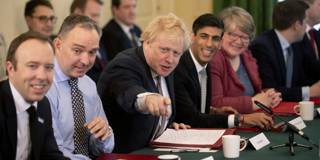UK Prime Minister Boris Johnson, determined to overcome Treasury resistance to his vast spending ambitions, has ousted Chancellor of the Exchequer Sajid Javid. But Johnson’s latest coup also is indicative of a global shift from monetary to fiscal policy.
LONDON – The forced resignation of the United Kingdom’s Chancellor of the Exchequer, Sajid Javid, is the latest sign that macroeconomic policy is being upended, and not only in the UK. In addition to completing the ritual burial of the austerity policies pursued by UK governments since 2010, Javid’s departure on February 13 has broader significance.
Prime Minister Boris Johnson is determined to overcome Treasury resistance to his vast spending ambitions. The last time a UK prime minister tried to open the government spending taps to such an extent was in 1964, when Labour’s Harold Wilson established the Department of Economic Affairs to counter Treasury hostility to public investment. Following the 1966 sterling crisis, however, the hawk-eyed Treasury re-established control, and the DEA was soon abolished. The Treasury, the oldest and most cynical department of government, knows how to bide its time.
But Johnson’s latest coup also is indicative of a global shift from monetary to fiscal policy. After World War II, stabilization policy, the brainchild of John Maynard Keynes, started off as strongly fiscal. The government’s budget, the argument went, should be used to balance an unstable economy at full employment.

LONDON – The forced resignation of the United Kingdom’s Chancellor of the Exchequer, Sajid Javid, is the latest sign that macroeconomic policy is being upended, and not only in the UK. In addition to completing the ritual burial of the austerity policies pursued by UK governments since 2010, Javid’s departure on February 13 has broader significance.
Prime Minister Boris Johnson is determined to overcome Treasury resistance to his vast spending ambitions. The last time a UK prime minister tried to open the government spending taps to such an extent was in 1964, when Labour’s Harold Wilson established the Department of Economic Affairs to counter Treasury hostility to public investment. Following the 1966 sterling crisis, however, the hawk-eyed Treasury re-established control, and the DEA was soon abolished. The Treasury, the oldest and most cynical department of government, knows how to bide its time.
But Johnson’s latest coup also is indicative of a global shift from monetary to fiscal policy. After World War II, stabilization policy, the brainchild of John Maynard Keynes, started off as strongly fiscal. The government’s budget, the argument went, should be used to balance an unstable economy at full employment.